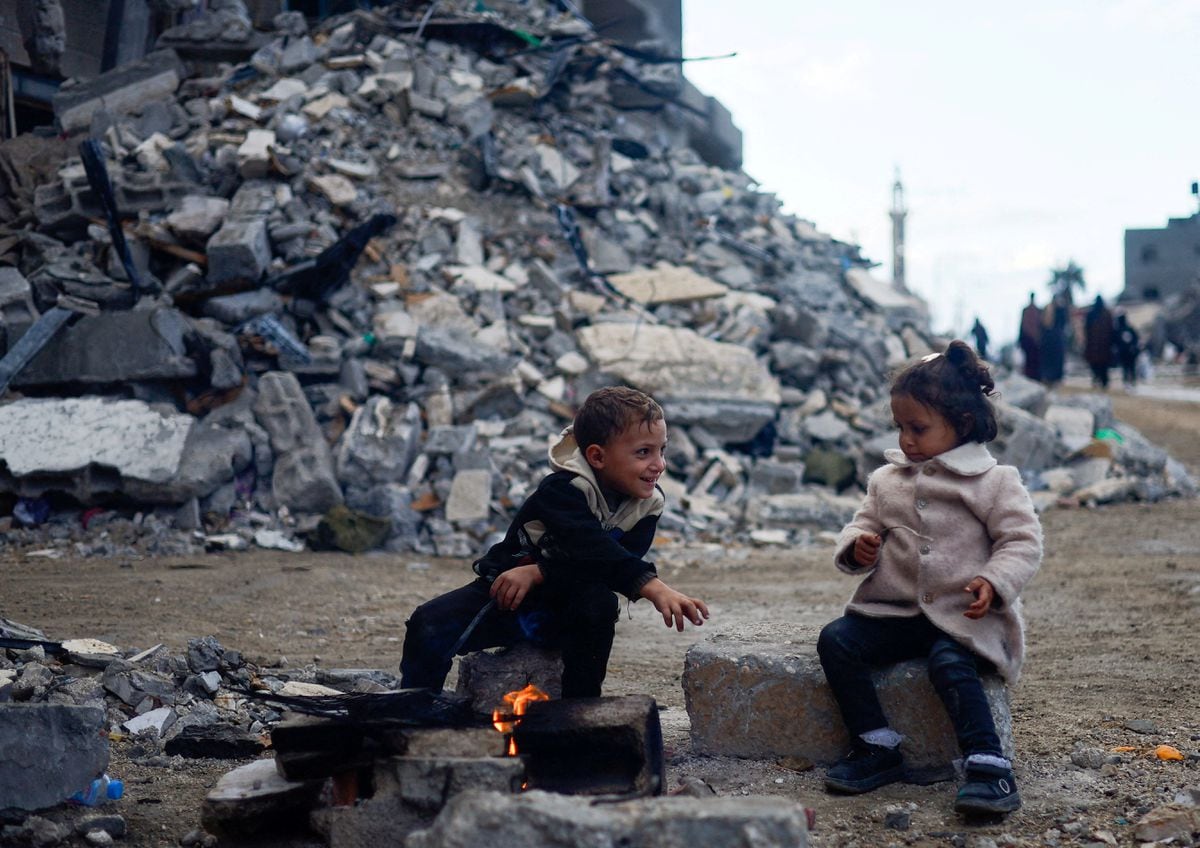The two-day extension of the truce has been met with a mixture of relief and restrained hope by Israelis and Palestinians. The first, because it will mean the release of at least 20 other women and children held hostage in Gaza; the second, for the release to East Jerusalem and the West Bank of another 60 prisoners and, above all, for adding a small respite to a devastated Strip, whose inhabitants live every day without bombing and every truck with humanitarian aid in the hope that it will not be the last.
In Israel, the Argentine-Israeli Bibas family issued a statement in which they stressed their "great uncertainty" after learning that the married couple formed by Yarden and Shiri, and their children Ariel (four) and Kfir, 10 months, would not be released on Monday either. Shortly after, the Israeli military reported that the four are not in the hands of Hamas, but of another unidentified Palestinian faction. "The agreement has given us hope, but no matter how much hope there is, I won't say that they are in our hands until I see them in front of me with my own eyes," Yair Keshet, Yarden's uncle, told this newspaper in Tel Aviv on Friday.
Men set up a structure in Khuzaa on Monday.SAID KHATIB (AFP)
"This afternoon's news brings a sigh of relief to our community. However, we remain deeply concerned for our loved ones still kidnapped," Osnat Peri, leader of Nir Oz, the Israeli kibbutz where 49 of the hostages taken in the October 7 attack still remain in Gaza, said in a statement. "We call for everyone's return, immediately, whatever the cost."
In Gaza, the population is only resignedly waiting for the ceasefire to become final. This is what the main mediators of the pact, Qatar and Egypt, are calling for, and Israel vehemently rejects. Its defense minister, Yoav Gallant, already warned on Thursday that the pause will be "brief" and the army will resume the war "with intensity" throughout Gaza.
"Yes, the shelling has stopped, but we need a truce that will allow us to return to our homes. If not, it doesn't make sense. I'd rather go home and die there than be in a tent living in shame and forced to depend on other people for basic necessities," Ayman Harb, a father of three who took advantage of the cessation of hostilities to cross south of the line to which Israel has displaced hundreds of thousands of people, told Al Jazeera.
Search for water and food
Palestinians are taking advantage of the absence of fighter-bombers in the sky to take to the streets to get food (scarce and expensive) or queue to fill jugs with drinking water. The Hamas government's Ministry of Health has also reported that the dialysis department of al-Shifa Hospital in the capital has resumed operations following the withdrawal of Israeli troops from its occupation.
Hamas is only extending the truce for 48 hours for the time being because it cannot commit to the surrender of 20 women and children, as it has to locate the rest, it assured Qatari mediators. One of the leaders of the Islamist armed group, Khalil al-Hayya, said late in the day that, after the additional two days, a new agreement must be negotiated that also includes adult males.
A woman takes an interest in fruit from a street vendor in Gaza City on Monday. Associated Press/LaPresse (Associated Press/LaPresse)
This is the case of Yonatan Samrano, kidnapped at the Nova festival. His mother, Ayelet, called on national public television on Monday for an end to the "hierarchization" of the hostages. "We have an obligation not only to receive what we are given, but to ask for. To dictate the list ourselves," he said. Or 18-year-old Itai Regev, whose sister Maya was released on Sunday under the pact. "It's very hard for Maya to be here and for Itai to be in Gaza. It's a merry-go-round of emotions that's hard to describe," said his mother, Mirit.
Visit of Sinwar
Although information about the condition of the freed Israeli hostages is being closely controlled, details about the conditions of their abduction in Gaza have been emerging, mainly from family posts on social media or local media reports.
As can be seen in the images, they are in apparent good physical condition, except for an 84-year-old woman who spent fifty days without medication for the chronic diseases she was suffering from and is seriously hospitalized. They were not assaulted or tortured, and were given medication intermittently. Astonishingly, Yahia Sinwar, Hamas' political leader in Gaza and Israel's most wanted man, visited some of them and tried to reassure them in Hebrew, a language he learned in prison.
All the hostages have lost weight because they received little food (usually rice, hummus, pita bread and water), in line with the situation faced by the majority of Gazans. Some have skin diseases, apparently from staying underground. Itai Pesach, manager of the Safra pediatric director near Tel Aviv, said the hostage children were being allowed to return home after receiving basic medical care and that psychologists were not asking them questions about what happened.
Those held underground slept on plastic benches and sometimes had to wait between an hour and two to go to the bathroom. A part was divided according to the locality in which they were captured, so they knew each other. Or he was allowed to have access to radio news in Hebrew. That's how a woman found out that her son had been murdered on October 7. Others only learned that they had lost loved ones that day once they returned to Israel.
Follow all the international news on Facebook and X, or in our weekly newsletter.
Subscribe to continue reading
Read without limits
Read more
I'm already a subscriber
_

